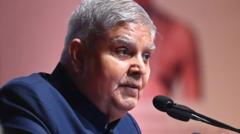Is the Indian Vice President's Resignation a Sign of Upcoming Changes?

The Sudden Resignation of India's Vice-President Jagdeep Dhankhar: An Analysis
The unexpected resignation of Jagdeep Dhankhar, India's Vice-President, has sent waves of speculation across political circles. This move, which occurred on the first day of the monsoon session, raises numerous questions about the political landscape in India. Citing health concerns, Dhankhar's decision to resign has prompted reactions from both sides of the political spectrum, leading to discussions about the implications of his departure. What does this mean for the future of Indian politics and governance? Let's delve deeper into the implications and context surrounding this significant event.
The Context of Dhankhar's Resignation
Jagdeep Dhankhar, who took office in August 2022, had a term that was meant to extend until 2027. His abrupt resignation on a day filled with parliamentary activities has raised eyebrows. Just hours before he submitted his resignation letter, he presided over a Rajya Sabha session and swore in new members. This indicates that his decision was sudden and possibly influenced by factors beyond his health concerns.
In his resignation letter, Dhankhar expressed gratitude for the opportunity to witness India's "remarkable economic progress." He made it clear that prioritizing his health was paramount. Yet, the timing and circumstances surrounding his resignation have led many, including opposition leaders, to speculate that there may be more to the story than what is being revealed.
Political Reactions: An Unexpected Turn
The reactions from various political figures have been varied, with many expressing surprise and concern regarding the implications of Dhankhar's resignation. Anand Dubey, spokesperson for the Shiv Sena (UBT) party, questioned the decision-making process within the government, highlighting the lack of consultation before such a significant move. His remarks underscore a growing sentiment of uncertainty among political leaders regarding the stability of the current administration.
Moreover, Congress MP Manish Tewari labeled Dhankhar's resignation as "totally unexpected," emphasizing the need to prioritize health while also hinting at underlying issues within the government. Jairam Ramesh, another Congress leader, characterized the resignation as "unprecedented," indicating that the circumstances surrounding it are unusual for the political climate in India.
Health Concerns: A Valid Reason?
Health concerns are often cited as a primary reason for political resignations. In Dhankhar's case, he underwent angioplasty in March but returned to his duties shortly after. This raises questions about the severity of his current health issues. If health were genuinely the sole concern, why did he not resign earlier or after the session? This discrepancy has led to skepticism surrounding the legitimacy of the stated reasons for his resignation.
Implications for the Vice Presidency
With Dhankhar's resignation, the Vice President's position is now vacant, which has a direct impact on the functioning of the Rajya Sabha. Typically, the responsibilities of the Vice President include presiding over sessions of the upper house and ensuring the smooth conduct of parliamentary procedures. In the interim, these responsibilities will fall to the Deputy Chairperson of the Rajya Sabha or another designated member appointed by the President.
The Vice Presidency is a crucial role in maintaining the balance of power in the Indian Parliament. The sudden vacancy could lead to disruptions in parliamentary proceedings, especially with important legislative matters on the agenda during the monsoon session. The ruling Bharatiya Janata Party (BJP) has yet to disclose its plans for appointing a new Vice President, leaving many wondering about the potential shifts in political dynamics.
Dhankhar's Political Journey
Jagdeep Dhankhar's political career spans several decades. He first entered politics as an MP from Rajasthan's Jhunjhunu seat in 1989 and was later appointed as the Governor of West Bengal in 2019. During his tenure, he often found himself at odds with the state government led by the Trinamool Congress party. His political journey is marked by significant milestones, and his recent resignation raises questions about his legacy and the impact of his departure on the BJP's strategies moving forward.
Future of the BJP and Political Landscape
As the ruling party, the BJP faces a critical juncture with the unexpected resignation of one of its prominent leaders. The party's response to Dhankhar's resignation will likely shape its image and strategies leading up to the next elections. The ongoing monsoon session is pivotal for legislative activities, and the absence of a Vice President could hinder the BJP's agenda.
Additionally, the speculation surrounding the reasons for Dhankhar's resignation may lead to increased scrutiny of the BJP's internal dynamics. With various factions within the party, how the BJP chooses to navigate this situation could significantly impact its cohesion and public perception in the coming months.
Conclusion: A Turning Point in Indian Politics?
The resignation of Jagdeep Dhankhar marks a significant moment in Indian politics, raising questions about the health of political leadership, the internal dynamics of the ruling party, and the implications for governance. As political leaders react and speculate about the underlying causes, the situation serves as a reminder of the fragility of political stability. Will this resignation lead to a re-evaluation of leadership within the BJP, or will it merely be seen as a health-related decision? Only time will reveal the full implications of this unexpected move.
FAQs
What led to Jagdeep Dhankhar's resignation as Vice-President of India?
Jagdeep Dhankhar cited health concerns as the reason for his resignation, but many political leaders believe there may be more to it than is being disclosed.
How will Dhankhar's resignation affect the Rajya Sabha?
The responsibilities of the Vice President, who presides over the Rajya Sabha, will temporarily fall to the Deputy Chairperson or another designated member, which could impact legislative proceedings.
What has been the political reaction to Dhankhar's resignation?
Political reactions have been mixed, with many opposition leaders expressing surprise and concern, indicating that more may be behind Dhankhar's decision than health issues alone.
As the political landscape continues to evolve, one must ponder: what does the future hold for India's governance, and how will the ruling party adapt to these changes? #IndianPolitics #VicePresident #BJP
```Published: 2025-07-22 08:54:07 | Category: world



